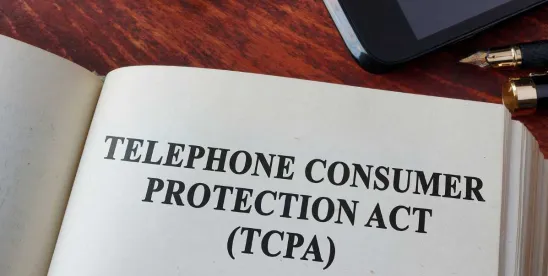Earlier this week, an order out of the U.S. District Court for the Southern District of Illinois made for some interesting analysis of state law claims, personal jurisdiction, and agency relationships under the TCPA.
In Angelina Showers v. Pelican Investment Holdings Group, LLC & Others, Case No. 3:23-CV-2864-NJR (September 30, 2024), Plaintiff Angelina Showers brought a class lawsuit alleging that the defendants in this case acted together to engage in an automated solicitation campaign to sell Vehicle Service Contracts (“VSC”) across the country, including to people on the National Do-Not-Call registry, in violation of the Telephone Consumer Protection Act (“TCPA”) and the Illinois Telephone Solicitations Act (“ITSA”). Defendants moved to dismiss the complaint for lack of personal jurisdiction and failure to state a claim and moved to strike Showers’s class action allegations. The motions to dismiss were granted in part and denied in part, while the motions to strike were denied.
Background
Plaintiff alleges that she received multiple unsolicited phone calls from Defendant Pelican Investment Holdings Group, LLC (“Pelican”), despite registering her phone number on the National Do-Not-Call Registry. Plaintiff claims the calls were part of a scheme created by Defendants Dimension Service Corporation (“Dimension”) and SunPath LTD (“SunPath”) to sell VSCs across the country and that both Dimension and SunPath were administrators for the VSC scheme. Plaintiff further alleges that Pelican acted as an agent for all Defendants by carrying out the calling scheme, and that Defendant Sing for Service, LLC, doing business as Mepco (“Mepco”), processed the consumers’ VSC policy monthly premiums.
The defendants—Pelican, Dimension, SunPath, and Mepco—responded by filing motions to dismiss the lawsuit, arguing that the court lacked personal jurisdiction over certain defendants and that the complaint failed to meet federal pleading standards. They also sought to strike Showers’ class action allegations, contending that the proposed class definitions were impermissible “fail-safe” classes, which depend on proving liability before determining class membership.
Class Definitions
Showers seeks to represent the following classes:
Nationwide Class of “all natural persons in the United States of America who, during the applicable statute of limitations, received a telephone call from Defendants that: (1) was initiated to a residential telephone subscriber who has registered his or her telephone number on the national do-not-call registry of persons who do not wish to receive telephone solicitations that is maintained by the federal government; and (2) was initiated at a time when the called party had not given Defendants prior express consent for such calls.”
Illinois Subclass of “all natural persons in the State of Illinois who, during the applicable statute of limitations, received a telephone call from Defendants wherein: (1) the live operator did not immediately state his or her name, nor the name of the business or organization being represented; (2) the live operator represented that they were soliciting “Extended Warranties;” and/or (3) the consumer made payment over the telephone without providing express written consent for the payment.”
Personal Jurisdiction: Can Dimension and SunPath Be Sued in Illinois?
One of the central arguments presented by the defendants was that the court lacked personal jurisdiction over Dimension, an Ohio-based corporation, and SunPath, a Delaware-based corporation with its principal place of business in Massachusetts.
The Court noted that it may exercise personal jurisdiction over an out-of-state defendant if either federal law or the law of the state in which the court sits authorizes service of process to that defendant. While the TCPA does not authorize nationwide service of process, Illinois’s long-arm statute authorizes jurisdiction over a non-resident through conduct of an agent.
Ultimately, the Court agreed that Showers had adequately demonstrated that an agency relationship existed between Pelican and the other defendants, allowing it to exercise personal jurisdiction over Dimension and SunPath under Illinois law. The Court found that because Pelican’s actions were tied to the alleged telemarketing scheme and Pelican was subject to personal jurisdiction in Illinois, Dimension and SunPath could be sued in Illinois as well.
Pleading Standards: Did Showers’ Complaint Meet the Requirements?
The Defendants also argued that Showers’ complaint constituted a “shotgun pleading,” meaning it failed to specify which defendant committed which wrongful act. This, they claimed, prevented them from adequately responding to the allegations. Mepco argued that the complaint was especially deficient in relation to its role, claiming it was only a payment processor for the VSCs and had no knowledge of the telemarketing campaign.
The Court disagreed with the Defendants. It ruled that Showers’ complaint sufficiently set forth facts showing that all defendants were involved in the alleged scheme, either directly or indirectly. The court noted that Showers detailed how Dimension and SunPath acted as principals in the scheme, while Pelican executed the telemarketing, and Mepco processed consumer payments. Despite referring to the parties collectively as “Defendants,” the court ruled that this did not make the complaint confusing or deficient, and the allegations were sufficient to move forward.
Vicarious Liability Under the TCPA
One of the key arguments in the case was whether the defendants could be held vicariously liable under the TCPA. Direct liability under the TCPA applies to the entity that physically makes the phone call. However, Plaintiff did not argue that Dimension, SunPath, or Mepco placed the calls themselves but instead relied on the theory of vicarious liability, claiming they acted through their agent, Pelican.
The Court agreed with Plaintiff that the TCPA allows for vicarious liability under broad agency principles, including actual authority, apparent authority, and ratification. The Court found that Plaintiff had sufficiently alleged that Pelican acted on behalf of Dimension and SunPath by making the telemarketing calls, and that Mepco ratified the conduct by processing the payments. While the Court acknowledged that the allegations lacked some specific details, they were enough to create a plausible inference of an agency relationship, allowing the case to proceed on these grounds.
Violation of the National Do Not Call Registry
The Defendants next argued that Showers has failed to state a claim for violation of 47 C.F.R. § 64.1200(c), which prohibits initiating a telephone solicitation to a person who has registered his or her telephone number on the National Do Not Call Registry. Dimension, SunPath, and Pelican all argued that Showers has not alleged that she personally registered her phone number on the Do Not Call Registry, which, they asserted, is fatal to her claim. However, the Court disagreed, stating, “Defendants are inserting an adverb into regulatory text that is not actually there”, and finding that there is no requirement that an individual have personally registered the phone number. Thus, Plaintiff’s claim under § 64.1200(c) was not dismissed.
Failure to Maintain Internal Do Not Call List and Policy
The Court turned to the argument by Dimension, SunPath, and Pelican that Plaintiff has not stated a claim under 47 C.F.R. § 64.1200(d), which requires telemarketers, among other things, to have a written policy for maintaining a do-not-call list, and to record and honor do-not-call requests. Defendants argued that the Complaint does not specify any request by Plaintiff to access their internal policies or be placed on their do-not-call lists.
As an initial matter, the Court rejected the Defendants’ argument that their is no private right of action under § 64.1200(d). However, the Court agreed with the Defendants that the Plaintniff’s allegations that Defendants do not have a “Do Not Call” database and do not have a “Do Not Call” policy are “nothing more than conclusory, formulaic recitations of the elements of the cause of action.” Accordingly, Plaintiff’s claim under § 64.1200(d) was dismissed.
Claims Under the Illinois Telephone Solicitations Act (ITSA)
In addition to the TCPA, Plaintiff brought claims under the ITSA, which sets stricter standards for telemarketing calls in Illinois. Plaintiff claimed that the Defendants’ live operators failed to state their names or the names of the companies they represented and misrepresented the purpose of the calls by claiming they were selling “extended warranties” instead of VSCs. She also alleged that the Defendants solicited and collected payment over the phone without obtaining express written consent, in violation of the ITSA.
The Defendants moved to dismiss these claims, arguing that Plaintiff had not provided enough details to support her allegations. However, the court found otherwise, noting that the factual allegations pleaded by the Plaintiff were sufficient to state a claim. As a result, the ITSA claims were allowed to proceed.
Class Definitions: Are the Proposed Classes “Fail-Safe”?
The Defendants also moved to strike Showers’ proposed class definitions, arguing that they were impermissibly “fail-safe.” A fail-safe class is one where membership is defined in such a way that only those who have valid legal claims can be part of the class.
The Court agreed that the proposed nationwide class and Illinois subclass were fail-safe, as they both defined membership based on the lack of prior consent to receive the telemarketing calls, which is an element of liability under the TCPA. However, rather than striking the class definitions outright, the Court allowed Plaintiff the opportunity to amend her class definitions to avoid this issue.
So, there it is – another mixed bag for TCPA defendants, and yet another instance of a Court looking favorably on a Plaintiff’s vicarious liability arguments. Now, more than ever, there is a need for businesses to make sure their third-party and vendor agreements are airtight.




 />i
/>i

